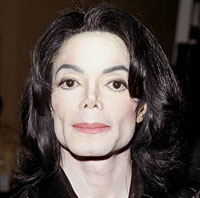 When exactly the media reached the tipping point in its gluttonous, ravenous coverage of Michael Jackson’s death, I don’t know. The information, rumor and innuendo have been coming at me from my TV, my laptop, and my radio at a blistering pace. And though I certainly agree Jackson has left a pop culture legacy and I absolutely feel enormous empathy for Jackson’s entire family, especially his children, I don’t actually grieve the loss of Michael Jackson. It took watching snippets of the Jackson memorial service yesterday for me to gain some perspective and finally understand why.
When exactly the media reached the tipping point in its gluttonous, ravenous coverage of Michael Jackson’s death, I don’t know. The information, rumor and innuendo have been coming at me from my TV, my laptop, and my radio at a blistering pace. And though I certainly agree Jackson has left a pop culture legacy and I absolutely feel enormous empathy for Jackson’s entire family, especially his children, I don’t actually grieve the loss of Michael Jackson. It took watching snippets of the Jackson memorial service yesterday for me to gain some perspective and finally understand why.
Thomas Lynch, a brilliant poet, writer, and funeral director, once wrote an excellent essay for the New York Times entitled “Grief, Real and Imagined” in which he shares his thoughts on the death of celebrities in our media saturated culture– specifically the death of pro golfer Payne Stewart in a plane crash. But his insightful words are applicable to many a celebrity death–Princess Diana, John Kennedy, Jr., Natasha Richardson, and Heath Ledger to name a few. Lynch’s thesis, if you will, is that while a sudden loss of someone in the public eye is indeed sad and even newsworthy, we as the general public do not, and in fact, cannot, truly grieve for them. Instead, we as fans, enemies, or something in between, create something he refers to as the therapy of spectacle, something he doesn’t believe is very therapeutic at all.
I was reminded of Lynch’s words first when I listened to Jackson’s brother Marlon tell a funny story about Michael trying to disguise himself and Marlon still picking him out of a crowd at a music store, telling Michael “You’re my brother, I can spot you anywhere.” In sharing that story, I saw Marlon’s grief because grief can only come, as Lynch espouses, from intimate knowledge and real investment in someone’s life. I felt that way again as I listened to Brooke Shields share childhood memories of Jackson and, of course, I felt that way when I heard daughter Paris tell the world how much she loved her father. As Lynch says, “We only grieve our losses when we play for keeps– real love, real hate, real attachments broken.”
On the other hand, when I listened to people screaming from the audience, when I watched the montages on the screen, when I see the words on stage saying Michael Jackson would live forever, I realized that is the therapy of spectacle, not grief. Therapy of spectacle according to Lynch is “user-friendly catharsis” and he believes “constant coverage and analysis of funerals often obscures their deeper meanings.” Watching the dazzling music numbers– not to mention the crowds huddled outside of the Staples Center via live streaming on my laptop–I have to say I agree with Lynch. We as a culture are becoming too comfortable with virtual experience versus authentic ones and there is a danger in that.
Still I believe the Jackson family was in all sincerity doing the best it could to try to honor Michael yesterday by offering some kind of forum for those who had followed Jackson’s career. I don’t know exactly what the better answer would have been, as they would have been hounded if they had not had the memorial. My only hope now is that the media–and fans–will back off and respectfully give the family a whole lot of space.
Related Features:



